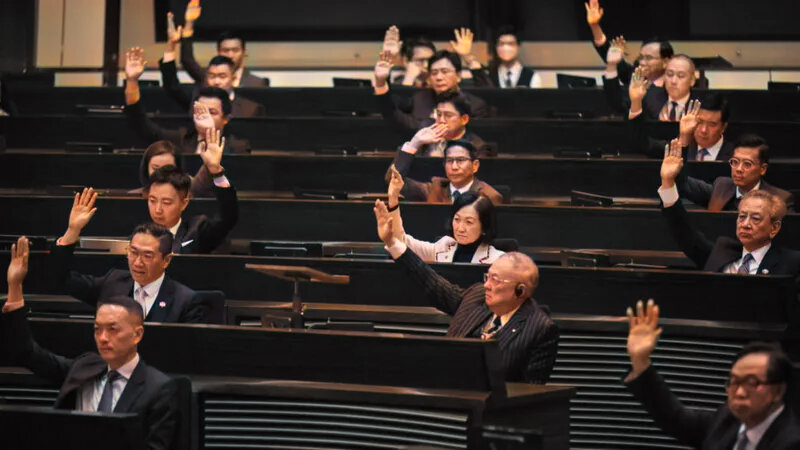The new security law in Hong Kong has drawn criticism from human rights organizations, the UN, and Western leaders who claim it further curtails liberties.
Targeting a number of offenses deemed treasonous, Article 23, as it is known locally, was unanimously approved by the city’s pro-Beijing assembly.
Proponents of the bill claim it is necessary for stability, while opponents dubbed it “a nail in the city’s coffin.”
China has long urged lawmakers to approve the measure and predicted that their “smears” would be ineffective.
The new law, among other things, permits closed-door proceedings, grants police the authority to hold people without formal charges for up to 16 days, and imposes life sentences as punishment.
Frances Hui, an activist now residing in the United States, called the new national security legislation “a last nail in a closed coffin” and said it would “redouble the crackdown on freedoms in Hong Kong with extended heinous sentences and an expanded definition of national security.”
A group of 81 MPs and public figures from various countries, including the US, UK, Canada, and South Korea, released a statement together on Tuesday expressing “serious concerns” about the bill, which criminalizes secession, subversion, terrorism, and collusion with foreign forces and expands the National Security Law that Beijing imposed in 2020.
“The legislation undermines due process and the right to a fair trial and violates Hong Kong’s obligations under international human rights law, jeopardizing Hong Kong’s role as an open international city,” the statement added, describing it as another “devastating blow” on liberty.

The EU expressed concern that the bill might impact the city’s standing as an economic hub, echoing the United States’ statement that it was “alarmed” by the “broad and…vaguely defined” sections of the legislation.
As for the bill, UK Foreign Secretary David Cameron claimed it will “entrench a culture of self-censorship” and “further damage rights and freedoms” in the former British colony. A “whistleblowing culture” may have emerged in the city, so citizens of Hong Kong told the BBC they are already cautious about what they say to friends and coworkers.
After hearing Lord Cameron’s remarks, the Chinese embassy in the UK strongly objected, calling them “a serious distortion of the facts”.
In response to criticism leveled about Article 23, the Chinese government stated that it is “unwaveringly determined to safeguard national sovereignty, security and development interests, implement the ‘one country, two systems’ policy, and oppose any external interference.” regarding affairs in Hong Kong.
Foreign Ministry spokesman Lin Jian declared at a routine news briefing in Beijing that “all attacks and smears will never succeed and are doomed to fail.”
Leader of Hong Kong, John Lee, had earlier supported the bill, which was pushed through to a final stage on Tuesday. He claimed the legislation would assist the city in “effectively preventing, suppressing and punishing espionage, conspiracy and cheating activities” of foreign intelligence agencies, as well as infiltration and sabotage by opponents.
“From now on, the citizens of Hong Kong will never again suffer these harms and sorrows,” he stated.
But the new law is seen as just another lost battle by those who spearheaded pro-democracy demonstrations against China’s increasing sway in the city.
Former Hong Kong lawmaker Nathan Law, who is presently living in exile in the UK, said on the BBC’s Newsday program that this moves Hong Kong “one step closer to the mainland Chinese system”.
“The chilling effect… and the resultant collapse of civil society are impacting the vast majority of Hong Kongers.”
Hui expressed his concern that Hong Kongers living overseas or their loved ones back home would be the target of the bill. Prior to this, the city detained four people for aiding individuals abroad who “endanger national security” and offered incentives for information about activists who left Hong Kong.
After Beijing enforced the NSL in 2020, which has resulted in over 260 arrests, Hui left Hong Kong. In reaction to the widespread pro-democracy demonstrations that rocked the city in 2019, it was introduced.
Four years after the NSL went into effect, he claimed that civil liberties were “long gone” in Hong Kong.
“Another big nail in the coffin of human rights and the rule of law in Hong Kong and a further shameful breach of the Joint Declaration,” was how former British governor of Hong Kong, Chris Patten, put the legislation.
The “one country, two systems” theory, which gave the city some autonomy, allowed the United Kingdom to cede Hong Kong to China in 1997. Although Beijing and Hong Kong maintain that this is still the case, skeptics and international human rights organizations assert that China’s hold over the city has only gotten stronger over time.

